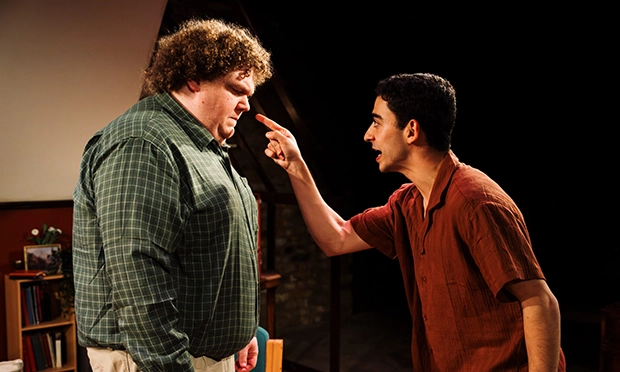Gentlemen, Arcola Theatre, stage review: ‘Ripping ride of dark comedy’

Edward Judge and Issam Al Ghussain in Gentlemen. Photograph: Alex Brenner
Covid ruffled many things: the concept of a staycation, my flimsy attempts at sobriety and, more glaringly, many a theatre kid’s dream.
Yet hope flutters its feathered eyelashes. More than 1,200 days after its planned premiere, Matt Parvin’s new play, Gentlemen, rises from the virus-tinted gloom and returns to its rightful place at the Arcola.
Studio 2, black box – simple, plain but also incredibly versatile. Cecilia Truno crafts space remarkably well. Sofa, chairs, bookshelves, record player, notice boards crammed with advice and call lines, a world of lived details. Considering this is the same space that only had an armchair and a lamp for my last visit to review In Other Words, the illusion of purpose is impressive. Tardis-like, one could say.
But this is more than just an office. This is a quagmire, a wrestling arena, a colosseum, a place where concepts, ideology, personality and class come to wallow in a pool of filth.
I will expand, or contract, considering the above sentences’ threat of hyperbole.
Said office sits in one of the hallowed Oxbridge universities. Charlie Beck is Greg, a jack-the-lad (in theory) pulled into hot water by his relationship with Kasper (played by Issam Al Ghussain).
Things kick off with a case of plagiarism – a case is muddied by both students and meetings with mediation officer Timby (Edward Judge). And so the mud-slinging begins.
As the play progresses, Greg’s linguistic gymnastics and outright manipulation of both his fellow student and Timby seems to save him from the initial charges. Darker allegations of homophobia abound, and an abrupt twist explodes a Pandora’s box of rippling disaster.
Parvin’s script involves pointed wordplay, lugubrious monologues, concept-heavy text, tense undercurrents, and a brief flirtation with surrealism.
Characters ricochet off one another into rants about idealism and identity, which keeps the one-room setting feeling fresh (at least for the first act).

Charlie Beck and Edward Judge as Greg and Timby. Photograph: Alex Brenner
The concepts of revenge, retribution, cancel culture, culpability, and fitting in are threaded together with confidence by the mouthy script.
The heady and terrifying world of freshers wafts up like coffee laced with blue WKD.
Beck’s swaggering Greg at first comes across as the cocky bully that many of us have unpleasantly encountered at school. Yet a masterful performance disrobes this facade, leaving an ordinary, lonely boy who is striving to fit in and achieve.
The pleading, ‘I’ve said sorry, doesn’t that matter’, with voice breaking, bravado crumbled, is an arch of soaring proportions.
Judge as Timby is comic gold, an utterly useless welfare officer bleeding a strain of desperation and naivety that is deeply frustrating to witness. “Squash and biscuits” with a side of platitudes is all he seems to offer, at points where so much more is needed.
A lovely moment of weighing Timby’s stress-induced sweet treats speaks to Richard Speir’s directorial attention to detail.
Kasper is a contradictory character, played at first as a quiet loner struggling with his bisexuality. But a sudden power flip at the end of the first act comes out of nowhere. Ghussain is unable to fully embody this abrupt change in tone, with actions seemingly blocked out but not eternally actualised.
Brevity is an issue all writers face. My editor’s face when another 1,000-word review crosses his digital doorstep is a testament to the fact. But in theatre and especially fringe pieces, shorter is normally the sweeter. Leave them wanting more, imagining the rest of the story, anticipation whetted (cheeky).
The play’s first act is a ripping ride of dark comedy. Snapping at its own heels, finishing with clashes between the boys – metaphorical and almost physical.
The second act feels stretched out in comparison. Languid and ludicrous dream sequences (gay General Franco anyone?), repetitive monologues, a stumbling plot and an extended crescendo mean the play never quite achieves its ambitious aims.
Judge’s talent is worn threadbare as he closes the piece alone with an onstage breakdown – never an easy task.
However, Parvin’s script and Speir’s directing manage to balance well on that splattered fence of the culture war debate.
Gentlemen cleverly asks us who has the right to decide, and gives a hilarious bumbling example of ineffective pastoral support.
In the supposedly safe environment of university, class, sexuality and power are striving for a voice, and this piece articulates that with a cruel smile and brutal strokes.
Gentlemen runs until 28 October at the Arcola Theatre.
